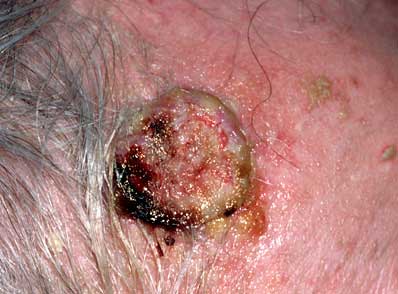Squamous Cell Carcinoma
Medical Dermatology - Skin Cancer
Squamous cell carcinoma is the second most common cancer of the skin. More than 250,000 new squamous cell carcinomas are diagnosed every year in the United States. Middle-aged and elderly people, especially those with fair complexions and frequent sun exposure, are most likely to be affected.
Squamous Cell Carcinoma
Medical Dermatology - Skin Cancer
Squamous cell carcinoma is the second most common cancer of the skin. More than 250,000 new squamous cell carcinomas are diagnosed every year in the United States. Middle-aged and elderly people, especially those with fair complexions and frequent sun exposure, are most likely to be affected.
This Skin Cancer Starts Out as Sandpaper Lesions
The cancer develops in the outer layer of the skin (the epithelium). Some squamous cell carcinomas arise from small sandpaper-like lesions called solar (sun) or actinic keratosis. It is possible for squamous cell carcinoma to spread to other areas of the body; therefore, early treatment is important. Although SCC is not often fatal, many of these lesions occur in the head and neck region, where surgery for advanced-stage disease can be disfiguring.
The classic presentation of a SCC is that of a shallow ulcer with heaped-up edges, often covered by a plaque, usually in a sun-exposed area. Typical surface changes may include the following:
-
Scaling
-
Ulceration
-
Crusting
-
A cutaneous horn
Squamous Cell Carcinoma (Skin Cancer) Treatment
Low-risk squamous cell carcinoma (SCC) on the trunk and extremities can be treated with electrodessication and curettage (ED&C). For invasive SCC, surgical excision and Mohs micrographic surgery are the primary treatment options; with appropriate patient selection, these techniques have comparable cure rates. Radiation therapy is typically used as an adjuvant to surgery, to provide improved locoregional control, but it may be used as primary therapy in patients who are unable to undergo surgical excision.
















